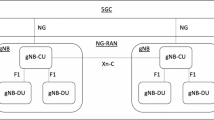Abstract
Wireless systems based on the IEEE 802.11 standard are known to suffer a performance degradation when just a single station in the network experiences bad channel conditions toward the Access Point (AP). This phenomenon, known as the “performance anomaly”, is mainly due to the max-min throughput fairness of the CSMA/CA algorithm of the 802.11 MAC. The simple FIFO scheduling policy usually implemented in the AP also contributes to this problem. In order to overcome the performance anomaly, we propose the Deficit Transmission Time (DTT) scheduler. The aim of DTT is guaranteeing each station a fair medium usage in terms of transmission time. This feature, directly related to the proportional fairness concept, allows to ideally achieve exact isolation among the traffic flows addressed to different stations. DTT achieves this goal taking advantage of measurements of actual frame transmission times. Experiments carried out using a prototype implementation of DTT are compared with analogous tests performed with a classic FIFO queue of a commercial AP and a recently proposed traffic shaping scheme aimed at solving the same 802.11 performance anomaly.
Similar content being viewed by others
References
Y. Cao, V.O.K. Li, Scheduling algorithms in broadband wireless networks, Proceedings of the IEEE, Volume 89, Issue 1, Jan. 2001, pp. 76–87.
J. Hartwell, A. Fapojuwo, Modeling and Characterization of Frame Loss Process in IEEE 802.11 Wireless Local Area Networks, Proc. of IEEE VTC Fall 2004, Los Angeles, CA USA, Sept. 2004.
M. Heusse, F. Rousseau, G. Berger-Sabbatel, A. Duda, Performance Anomaly of 802.11b, Proc. of IEEE Infocom 2003, San Francisco, April 2003.
R.G. Garroppo, S. Giordano, S. Lucetti, F. Russo, IEEE 802.11b Performance Evaluation: Convergence of Theoretical, Simulation and Experimental Results, Proc. Networks 2004, vol. 1, pp. 405–410, Wien 2004.
B. Radunovic, J. Le Boudec, Rate Performance Objectives of Multihop Wireless Networks, IEEE Trans. on Mobile Computing, vol. 3, no. 4, pp. 334–349, Oct.–Dec. 2004.
R.G. Garroppo, S. Giordano, S. Lucetti, E. Valori, The Wireless Hierarchical Token Bucket: a Channel Aware Scheduler for 802.11 Networks, Proc. WoWMoM2005, June 2005, Giardini Naxos (ME), Italy.
M. Portoles, Z. Zhong, and S. Choi IEEE 802.11 Downlink Traffic Shaping Scheme For Multi-User Service Enhancement, Proc. IEEE PIMRC’;03, Beijing, China, Sept. 7–10, 2003.
P. Bhagwat, A. Krishna, and S. Tripathi, Enhancing throughput over wireless LANs using channel state dependent packet scheduling, Proceedings of InfoCom ’96, Mar. 1996, pp. 1133– 1140.
P. Ramanathan and P. Agrawal, Adapting packet fair queueing algorithms to wireless networks, in ACM MOBICOM ’98, Dallas, pp. 1–9.
J. Malinen, Host AP driver for Intersil Prism2/2.5/3, http://hostap.epitest.fi.
Y. Choi, S. Park, S. Choi, G. Lee, J. Lee, H. Jung, Enhancement of a WLAN-Based Internet Service, in Mobile Networks and Applications (MONET), Vol. 10, N. 3, pp. 303–314, January 2005.
L. Wischhof, J.W. Lockwood, Packet Scheduling for Link-Sharing and Quality of Service Support in Wireless Local Area Networks, Technical Report WUCS-01-35, Applied Research Laboratory, Washington University in St. Louis, November 2001.
J. Tourrilhes, Wireless LAN resources for Linux, 1996–2003, http://www.hpl.hp.com/personal/Jean_Tourrilhes/Linux/.
M.G. Arranz, R. Aguero, L. Munoz, P. Mahonen, Behavior of UDP-based applications over IEEE 802.11 wireless networks, Proc. of PIMRC 2001, San Diego, CA, USA 2001.
R.G. Garroppo, S. Giordano, S. Lucetti and E. Valori, TWHTB: A Transmission Time Based Channel-Aware Scheduler for 802.11 systems, Proc. of 1st Workshop on Resource Allocation in Wireless Networks (RAWNET 2005), Riva del Garda (TN), Italy, April 2005.
G. Tan, J. Guttag, Time-based Fairness Improves Performance in Multi-Rate WLANs, Proc. of USENIX 2004 Annual Technical Conference, July 2004, Boston (USA).
F.P. Kelly Charging and rate control for elastic traffic, European Transaction on Telecommunications, Volume 8, pp. 33–39, 1997.
J. Mo and J. Walrand, Fair End-to-End Window-Based Congestion Control, IEEE/ACM Trans. Networking, vol. 8, no. 5, pp. 556–567, Oct. 2000.
Li Bin Jiang, S.C. Liew, Proportional Fairness in Wireless LANs and Ad Hoc Networks, Proc. of IEEE Wireless Communications and Network Conference (WCNC), Mar. 2005.
B. Adamson, H. Greenwald, MGEN User’;s and Reference Guide, 2004, http://mgen.pf.itd.nrl.navy.mil/mgen.html.
R.G. Garroppo, S. Giordano, S. Lucetti and L. Tavanti, A measurement-based channel aware scheduler to lessen VoIP capacity degradation in 802.11 networks, Proc. of the IEEE International Conference on Communications (ICC 2006), Istanbul, Turkey, June 2006.
Author information
Authors and Affiliations
Corresponding author
Rights and permissions
About this article
Cite this article
Garroppo, R.G., Giordano, S., Lucetti, S. et al. Providing air-time usage fairness in IEEE 802.11 networks with the deficit transmission time (DTT) scheduler. Wireless Netw 13, 481–495 (2007). https://doi.org/10.1007/s11276-006-9201-7
Published:
Issue Date:
DOI: https://doi.org/10.1007/s11276-006-9201-7




